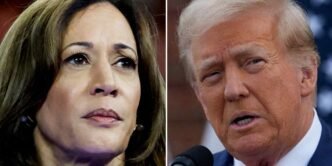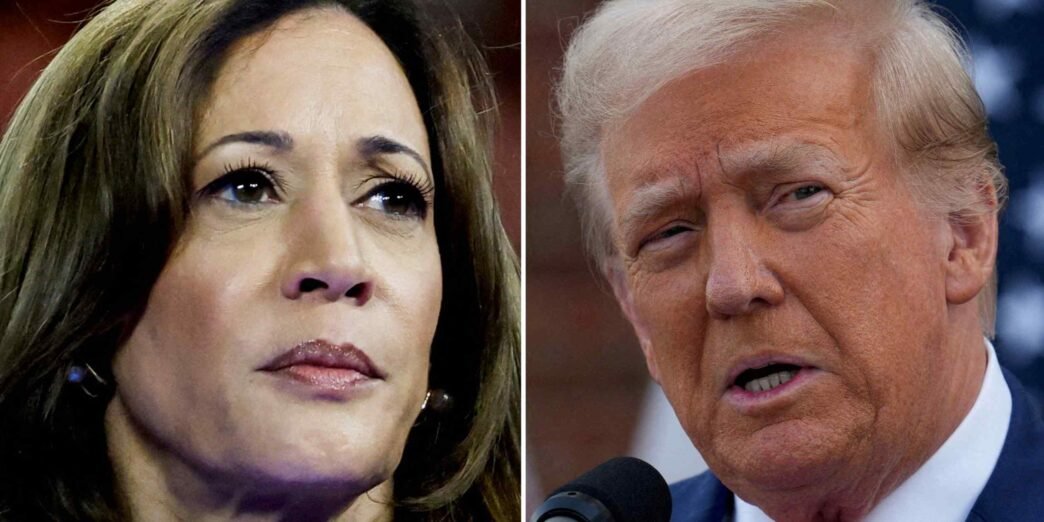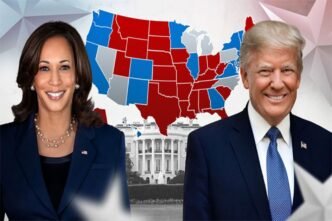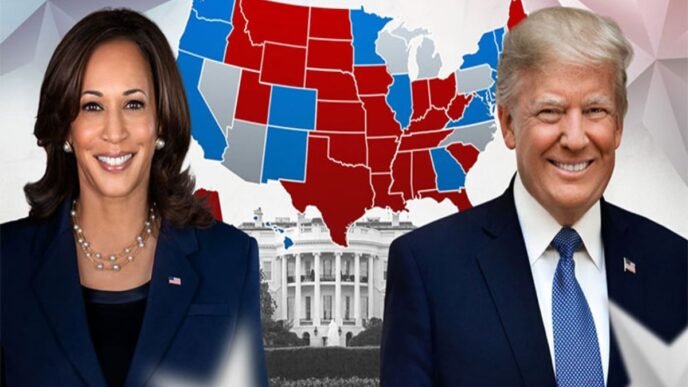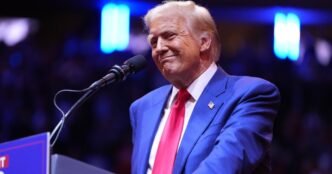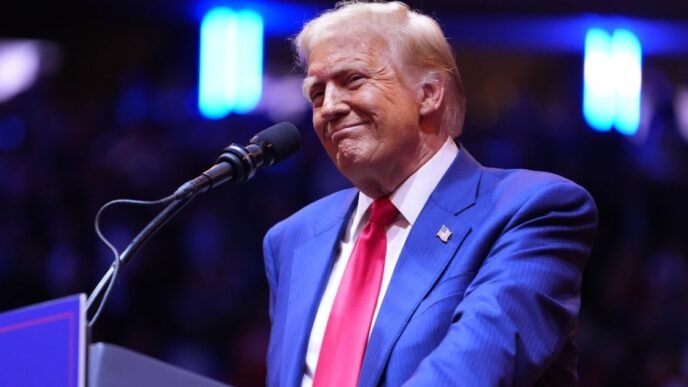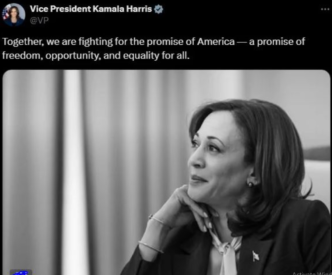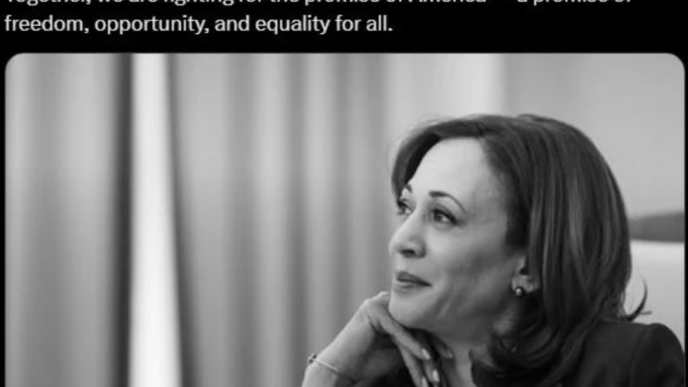NEW YORK — Republican former President Donald Trump gained the upper hand in the U.S. presidential election on Tuesday night as he was projected to win the key battleground state of North Carolina.
In addition to Republican-leaning states where he was expected to win, the victory in North Carolina gave him 230 of the 270 electoral votes needed for election. He was also leading in the other southern battleground, rgia, which like North Carolina has 16 electoral votes.
For Democratic Vice President Kamala Harris to win, it was looking more likely that she would have to sweep the three “blue wall” states of the U.S. Great Lakes region: Pennsylvania, Michigan and Wisconsin. She was trailing in all three, but significant numbers of votes remained to be counted.
Advertisement
As Harris and Trump offer starkly different views on the economy, trade, diplomacy and immigration, the outcome could reshape the U.S. for years, with the repercussions felt across Asia and globally.
Compiled by Nikkei staff writers and from wire reports. All times are U.S. Eastern Time.
Nov. 5
11.24 p.m. Trump is projected to win North Carolina, AP says, reaching 230 votes.
11.06 p.m. Idaho and Iowa are projected to go to Trump, bringing his total to 214 electoral votes.
11:04 p.m. Harris wins California and Washington, media projects, increasing her votes to 179.
10:13 p.m. Colorado and Washington D.C. are projected to go to Harris, boosting her total to 112.
10:03 p.m. Utah, Montana and Missouri are projected to go to Trump, giving him a total of 198 votes.
9:23 p.m. Texas, Ohio and Nebraska’s 3rd Congressional District go to Trump, lifting his total to 178 votes.
9:05 p.m. New York and Illinois go to Harris, boosting her total to 99 electoral votes. Trump is projected to take Louisiana, North Dakota, South Dakota, Wyoming and Nebraska, now totaling 120 votes. But Nebraska awards most of its electoral votes based on the outcome in its congressional districts, meaning Harris potentially can grab votes from individual districts.
8:45 p.m. Democrat Andy Kim of New Jersey will become the first Korean American senator in U.S. history, as the Associated Press has projected him as the winner against Republican rival Curtis Bashaw.
Born to Korean immigrant parents, Kim was first elected to the House of Representatives in 2018. He previously served as a diplomat in the State Department. Kim takes office later this month, rather than in Janu, to serve the remainder of Robert Menendez’s term after the longtime New Jersey senator resigned in August over corruption charges.
8:33 p.m. Trump is projected to take Arkansas, reaching 101 votes, while New Jersey, Delaware and Rhode Island go to Harris to lift her total to 52.
8:10 p.m. Trump is projected to win Oklahoma, Mississippi, Alabama, Florida, South Carolina and Tennessee, reaching 95 votes. Harris is projected to take Mland, Connecticut and Massachusetts, raising her total to 35.
7:35 p.m. West Virginia goes to Trump, lifting him to a total of 23 Electoral College votes, according to projections. Republicans also pick up a Senate seat in West Virginia, vacated by Joe Manchin, as Republican Gov. Jim Justice cruises to victory.
7:20 p.m. Trump wins Indiana, boosting his electoral vote total to 19, media projections show.
7:05 p.m. Trump wins the state of Kentucky, giving him 8 Electoral College votes, while Harris wins Vermont for 3 electoral votes, according to media projections.
5:32 p.m. Prelimin national exit polls from Edison Research show 73% of voters say American democracy is under threat, while just 25% say it is secure. Democracy and the economy rank as the most important issues for voters by far, with around one-third of respondents citing each, followed by abortion and immigration at 14% and 11%, respectively, the data shows.
4:44 p.m. A U.S. judge on Tuesday denies a bid by Republicans to block seven counties in the battleground state of rgia from accepting some absentee ballots, and chides the party’s lawyers for what he termed discrimination against political opponents.
The Republican National Committee on Sunday sued the seven counties in federal court for letting voters return absentee ballots over the weekend and on Monday. They said early voting was supposed to close on Friday.
U.S. District Judge Stan Baker, a Trump appointee, says those counties all leaned Democratic in previous elections, and that the RNC “cherry picked” the counties “based on nothing more than the past political preferences of the citizens.”
4:35 p.m. The Dow Jones Industrial Average closes up 1%, marking the fifth consecutive presidential election day it has gained ground. The Dow gains 427.48 points to close at 42,221.88. During previous presidential elections, the average advanced 2.1% on Nov. 3, 2020; 0.4% on Nov. 8, 2016; 1% on Nov. 6, 2012; and 3.28% on Nov. 4, 2008.
4:32 p.m. Retail stores, hotels and office fronts in Washington are boarded up in anticipation of potential violence.
The White House and Lafayette Square, a public park, are also fenced off with tall metal gates. Officials say they will not tolerate violence or unlawful behavior.
Pamela Smith, the chief of the Metropolitan Washington Police Department, said Monday: “We will hold all offenders accountable. We will not tolerate the destruction of property, and we will not tolerate threats to public safety, as well as this election process.”
4 p.m. Trading of shares in Trump Media & Technology Group is halted three times on Tuesday as prices gyrate, falling as much as 16% before closing 1% lower at $33.94.
The former president is the majority owner of Trump Media Group, which was established in 2021 and runs the social media platform Truth Social.
3:43 p.m. Harris stops at the Democratic National Committee headquarters in Washington, speaking to potential voters over the phone and thanking them for support.
Earlier in the day, the vice president participated in radio interviews in different swing states in a final push to increase voter turnout.
3:18 p.m. Harris’ running mate, Minnesota Gov. Tim Walz, assures voters that the election will be fair and accurate even if a final result takes longer than expected.
“We have the freest, most fair elections. It’s going to take some time to get results. They’re going to go up, down, up, down. But at the end of the day we will get results that we know are accurate,” he tells reporters in Harrisburg, Pennsylvania, where he was campaigning before getting on a plane to Washington.
3:01 p.m. The FBI says fake bomb threats were made to polling sites in several states from email domains that appear to originate from Russia. But it says, “None of the threats have been determined to be credible thus far.”
The announcement comes after a rgia poll worker was arrested Monday, accused of sending a letter to the Jones County elections superintendent that threatened poll workers with violence and a bomb threat.
1:30 p.m. Trump says he is “very confident” of victory after casting his ballot in Palm Beach, Florida.
The Republican presidential nominee, wearing a red MAGA hat, also tells reporters that he believed immigration had been the top issue of the campaign. Many Republican leaders had hoped that Trump would put more emphasis on inflation and other economic concerns of American voters.
“We have a great country, but we have a country that’s in trouble. It’s in big trouble in many ways, and we have to straighten it out,” he says, with his wife, Melania Trump, at his side.
12:30 p.m. At a polling site in Bethesda, Mland, a heavily Democratic area, Trump’s stance on immigration impresses one voter while Harris’ support for reproductive rights sways another.
Although Mland is thousands of kilometers from the southern border, Declan Le, a 25-year-old white writer, says he voted for the former president because every state is a border state.
“They may come into Texas, but they go to every state,” he says, adding that he believes Republican and Democratic politicians succumb to pressure from corporate donors to keep the borders open so that companies can hire cheap labor. “Trump is different.”
Chris, a 19-year-old Black student at Howard University, Harris’ alma mater, and first-time voter, says he voted for the vice president because of her support for reproductive freedom.
“Most issues go away after four years but birth and abortion are a life-changing matter,” he said.
12 p.m. Trump’s tough talk on China is resonating with some Asian American voters in New York’s Chinatown neighborhood, located in Manhattan.
“Trump can control China,” says Jimmy Truong, 37, a Vietnamese American who voted for the first time. Truong says he worries about what Trump tariffs might do to Vietnamese imports, but adds controlling China is “more important.”
Sero Chin, 58, is from Hong Kong and has has lived in the U.S. for more than 30 years, but says she only decided to apply for citizenship to vote for Trump in this election.
“After Trump came out I have a sensation of belonging in America,” she says, citing communism, illegal immigration and rising crime in New York City as her biggest policy concerns.
8 a.m. Asian Americans are the fastest-growing voting block in the U.S., numbering around 15 million, and could play an important role in deciding the battleground states of rgia and Nevada.
A September survey commissioned by APIAVote and I Data found that 66% of Asian Americans would vote for Harris while 28% supported Trump. Harris, the daughter of an Indian mother and a Jamaican father, would be the first president of Asian-American ancestry, if elected.
Asian American community leaders say Democrats have been more active than Republicans this year in reaching out to Asian voters, pointing to a nationwide series of Harris campaign advertisements in different Asian languages. The Republican Party, by contrast, shut down some of the Nevada community centers it had set up in 2022 to help members of minority groups register to vote.
7 a.m. According to ad tracking firm AdImpact, the top issue mentioned in Trump’s television advertisements was inflation, whereas Harris’ was taxation.
An accounting of ads between July and October showed Trump also highlighting the economy, housing, immigration and crime. Harris also focused on health care, housing, abortion and crime.
In Trump’s most-aired ad, titled “Prices,” Harris is seen saying, “Everyday prices are too high,” citing prices of food, rent, gas and back-to- school clothes. “A loaf of bread costs 50% more today,” she says.
Harris also appeared in her campaign’s most frequently run ad, saying: “As a prosecutor, I never asked a victim or a witness, are you a Republican or a Democrat? The only thing I ever asked them, are you OK?”
6 a.m. Harris will spend election night at her alma mater, Howard University. Graduates of the private, historically black university have included Supreme Court Justice Thurgood Marshall and Nobel Literature Prize laureate Toni Morrison, but never a president.
Trump will have a watch party at Palm Beach Convention Center in Florida, not far from his Mar a Lago estate. In 2016, Trump celebrated his election victory over Democrat Hill Clinton in New York. In 2020, Trump held an election night event in Washington.
Nov. 4
10 p.m. Billionaires Bill Gates and Mark Cuban, actors Harrison Ford and Arnold Schwarzenegger, actress Scarlett Johansson, musicians Taylor Swift, Madonna and Jennifer Lopez, and basketball star LeBron James are some of the celebrities who have endorsed Harris.
Billionaires Elon Musk and Bill Ackman, actors Mel Gibson and Jon Voight, retired American football star Brett Favre, and former astronaut Buzz Aldrin are among some of the famous figures who have endorsed Trump.
7 p.m. The battle to reach the required 270 electoral vote threshold could technically end in a 269-269 tie. In this case, the decision would go to the newly elected House of Representatives.
Each state delegation would have one vote. A majority of states — 26 of 50 — is needed to win. Senators, in turn, would elect the vice president.
The Congress meets in a joint session on Jan. 6, 2025, to count the electoral votes.
4 p.m. More than 81 million votes had been cast by late Monday, with women accounting for 54% of the electorate, a gender gap seen as a good sign for Harris, who has made abortion rights a centerpiece of her campaign.
By party, 38% of the early voters were registered Democrats, 36% were registered Republicans and 26% were independents or members of smaller parties. A relatively larger share of the early voters included Republicans, which could be helpful for Trump.
In 2016, 47 million voters cast ballots before Election Day. In 2020, when the COVID-19 pandemic raised the risk of going to the polls, 101 million people voted early.
